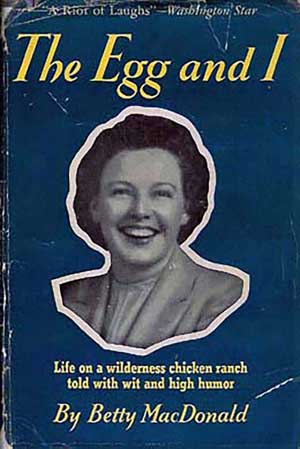On October 3, 1945, Lippincott publishes Betty MacDonald's (1907-1958) debut book, The Egg and I. American readers flock to bookstores to purchase Egg, the loosely autobiographical story of MacDonald's years as a young bride on a chicken ranch in the Chimacum valley on the Olympic Peninsula. Betty's biting and somewhat self-deprecatory humor coupled with her wittily original prose captivates war-weary readers, and the book becomes a gargantuan success.
The book's publication announcement in The New York Times in no way foreshadowed Egg's soon-to-be-global success. Egg's summation read, "Life on a wilderness chicken ranch" (October 3, 1945). Other books published the same day included Cass Timberlane by Sinclair Lewis, Many Long Years Ago by Ogden Nash, The High Barabee by Charles Nordhoff and James Norman Hall, several detective novels, and Valley of Power by Eleanor Buckles.
An abridged and somewhat bowdlerized three-part version of The Egg and I had appeared in the June, July, and August 1945 issues of the Atlantic Monthly, stimulating the reading public's interest in Betty's story. Egg was the September 1946 Book-of-the-Month Club selection. In November 1946, as Egg's sales figures continued to rocket up, The Reader's Digest published an abridged version. Egg was everywhere.
Betty's Funny Stories
The Egg and I was the physical manifestation of entertaining stories Betty MacDonald had been telling her friends for many years. Painter William Cumming (1917-2010), Betty's assistant when she worked for the National Youth Administration, remembered, "We screamed in helpless mirth ... as Betty recounted stories that would eventually reach the world as The Egg and I ... Betty's humor wasn't kindly, nor homey, nor friendly. It had the malicious edge of a scalpel, and it could cut. Betty saw the flaws of the race as vicious. The fact that these flaws generally ended in hilarious pratfalls didn't make them any less lethal in her eyes" (Sketchbook: A Memoir of the 1930s and the Northwest School, p. 179).
In Egg, MacDonald summed up her reaction to the supposed lure of bracing wilderness living: "Who(ever) said that wild animals won't bother you if you don't bother them ... must have lived in an apartment house and just finished reading Bambi" (1945 edition, p. 169). The Olympic Peninsula, she decided, "is describable only by superlatives. Most rugged, most westerly, greatest, deepest, largest, wildest, gamiest, richest, most fertile, loneliest, most desolate" (p. 41).
Of her wrestling match with the Pacific Northwest's most famous weather attribute, MacDonald wrote: "It rained and rained and rained and rained and rained. It drizzled -- misted -- drooled -- spat -- poured -- and just plain rained ... . Along about November I began to forget when it hadn't been raining and became as one with all the characters in all of the novels about rainy seasons, who rush around banging their heads against the walls, drinking water glasses of straight whiskey and moaning, 'The rain! The rain! My God, the rain!" (p. 67).
MacDonald's biting depictions of some of her Chimacum neighbors, later determined in a landmark court case to be composite characters, spawned a law suit and deep-seated enmity from those who felt themselves to have been acidly depicted. Although MacDonald's contemporary readers evidently were not troubled by it, many in later generations came to view her depictions of the Indians who were also her neighbors as racist. MacDonald's daughters, Anne MacDonald Evans Canham (b. 1928) and Joan MacDonald Keil (1929-2004), addressed this issue in their foreword to the book's 1987 paperback edition, stating "We are certain that if Betty were alive today, she would address the plight of the American Indian in a much different manner. We feel that she only meant to turn what was to her a frightening situation into a lighthearted encounter" (p. 8).
A Golden Egg
In addition to her witty prose and pert girl-next-door portrait splashed across Egg's pine green cover, Betty MacDonald's willingness to travel across the country making personal appearances and signing the book supported its continued publicity and meteoric sales. In February 1946 as Betty and her second husband, Don MacDonald (1910-1975), were en route to New York by car, The Seattle Times reported:
"Mrs. MacDonald will have a busy schedule when she arrives in Manhattan. She will be the guest of honor at the New York Herald Tribune Book and Author luncheon at the Hotel Astor March 5. Her publishers, J. B. Lippincott Co., will present her to New York literary celebrities at a cocktail party Wednesday, March 6 at the Ritz-Carlton. Tuesday, March 12 she will be in Washington, D.C. to be guest speaker at the Washington Post Book and Author program ... . she will (also) make four radio appearances" (February 24, 1946).
In addition to signing books, MacDonald was photographed signing eggs. In May of 1946 when International Pictures bought MacDonald's film rights to the book after a Hollywood bidding war, master publicist James S. Moran (1908-1999) generated additional press attention by sitting on an ostrich egg labeled "The Egg and I" for 19 days, 4 hours, and 32 minutes until it hatched.
The Egg and I went on to sell more than three million copies in hardback alone, with editions in 32 languages. Never technically out of print, the book eventually became listed as out of stock indefinitely, rendering booksellers unable to fill orders. In 1986 after years of pressure from Northwest booksellers, Harper & Row sales representatives, and MacDonald's daughters, Harper & Row brought out a new hardback edition, and the following year issued a deluxe trade paperback edition. The Seattle Times quoted Charles Schlessiger of Brandt & Brandt, Betty MacDonald's longtime literary agents: "There are books that we handle that we have high hopes for -- believe me -- that are published and then just disappear. But The Egg and I, it just goes on and on and on" (December 16, 1986).

